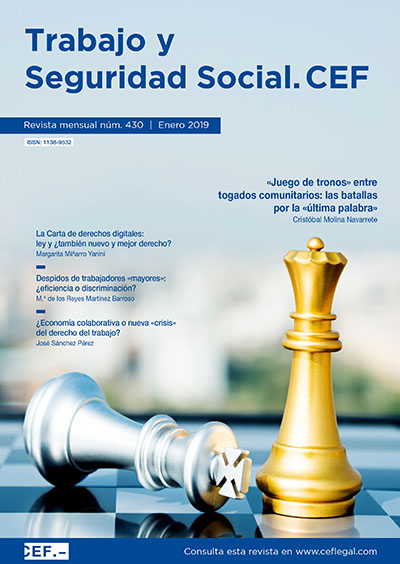Beyond work-life balance (WLB) practices. The role of the supervisor in returning to work after maternity in Europe
DOI:
https://doi.org/10.51302/rtss.2019.1412Keywords:
work-life balance practices, maternity, women, Europe, supervisor supportAbstract
Returning to work after childbirth is a relevant issue for the life course and professional careers of women, establishing itself as a central theme in the debates on gender equality. Although the existence in the organizations of work-life balance practices is determinant for women’s well-being due to the demands of the moment, such practices, including flexible working hours, can turn against women. From the general point of view, the fact of accepting the conciliation practices can be interpreted as a lack of commitment towards your organization, which results in a further obstacle to your progress in the professional career.
In view of this reality, the analysis of the importance of the supervisor’s support as a human complement to the formal adoption of work-life balance practices by the organization, represents a question not researched in the previous literature. The results achieved suggest that real and effective supervisor support to women so that they can reconcile their work and personal lives after motherhood, requires organizations to emphasize the relevance of the human factor to formal human resources practices.
Downloads
References
Allen, T. D., Herst, D., Bruck, C. y Sutton, M. (2000). Consequences associated with work-to-family conflict: a review and agenda for future research. Journal of Occupational Health Psychology, 5(2), 278-308. https://doi.org/10.1037/1076-8998.5.2.278
Baeriswyl, S., Krause, A. y Schwaninger, A. (2016). Emotional exhaustion and job satisfaction in airport security officers-work-family conflict as mediator in the job demands-resources model. Frontiers in Psychology, 7, 663. https://doi.org/10.3389/fpsyg.2016.00663
Brown, L. M. (2010). The relationship between motherhood and professional advancement: perceptions versus reality. Employee Relations, 32(5), 470-494. https://doi.org/10.1108/01425451011061649
Christensen, K. E. y Staines, G. L. (1990). Flextime: a viable solution to work-family conflict? Journal of Family Issues, 11(4), 455-476. https://doi.org/10.1177/019251390011004007
Clark, S. C. (2000). Work/family border theory: a new theory of work/family balance. Human Relations, 53(6), 747-770. https://doi.org/10.1177/0018726700536001
Coulson, M., Skouteris, H. y Dissanayake, C. (2012). The role of planning, support, and maternal and infant factors in women’s return to work after maternity leave. Family Matters, (90), 33-44.
Eaton, S. C. (2000). Work-family integration in biotechnology: implications for firms and employees (Doctoral dissertation). Massachusetts Institute of Technology.
Eisenberger, R., Huntington, R., Hutchison, S. y Sowa, D. (1986). Perceived organizational support. Journal of Applied Psychology, 71(3), 500-507. https://doi.org/10.1037/0021-9010.71.3.500
Eurofound (2015). Recuperado de https://www.eurofound.europa.eu/es/surveys/european-working-conditions-surveys/sixth-european-working-conditions-survey-2015
Franco-Santos, M. y Doherty, N. (2017). Performance management and well-being: a close look at the changing nature of the UK higher education workplace. The International Journal of Human Resource Management, 28(16), 2.319-2.350. https://doi.org/10.1080/09585192.2017.1334148
Greenhaus, J. H., Collins, K. M. y Shaw, J. D. (2003). The relation between work-family balance and quality of life. Journal of Vocational Behavior, 63(3), 510-531. https://doi.org/10.1016/S0001-8791(02)00042-8
Grice, M. M., Feda, D., McGovern, P., Alexander, B. H., McCaffrey, D. y Ukestad, L. (2007). Giving birth and returning to work: the impact of work-family conflict on women’s health after childbirth. Annals of Epidemiology, 17(10), 791-798. https://doi.org/10.1016/j.annepidem.2007.05.002
Guest, D. E. (2002). Perspectives on the study of work-life balance. Social Science Information, 41(2), 255-279. https://doi.org/10.1177/0539018402041002005
Guest, D. E. (2017). Human resource management and employee well-being: towards a new analytic framework. Human Resource Management Journal, 27(1), 22-38. https://doi.org/10.1111/1748-8583.12139
Hsu, Y. R. (2011). Work-family conflict and job satisfaction in stressful working environments: the moderating roles of perceived supervisor support and internal locus of control. International Journal of Manpower, 32(2), 233-248. https://doi.org/10.1108/01437721111130224
Jang, S. J. (2009). The relationships of flexible work schedules, workplace support, supervisory support, work-life balance, and the well-being of working parents. Journal of Social Service Research, 35(2), 93-104. https://doi.org/0.1080/01488370802678561
Keloharju, M., Knüpfer, S. y Tåg, J. (2017). What prevents female executives from reaching the top? IFN Working Paper, 1111, Harvard Business School Research Paper Series, 16-092.
Kleven, H., Landais, C. y Søgaard, J. E. (2018). Children and gender inequality: evidence from Denmark (n.º w24219). National Bureau of Economic Research.
Marcinkus, W. C., Whelan-Berry, K. S. y Gordon, J. R. (2007). The relationship of social support to the work-family balance and work outcomes of midlife women. Women in Management Review, 22(2), 86-111. https://doi.org/10.1108/09649420710732060
Maynard, S. A. y Blain, L. G. (2005). Women, work and childcare: where have we been? Where are we going? Work, 24(4), 361-367.
Parasuraman, S., Greenhaus, J. H. y Granrose, C. S. (1992). Role stressors, social support, and well-being among two-career couples. Journal of Organizational Behavior, 13(4), 339-356. https://doi.org/10.1002/job.4030130403
Skouteris, H., McNaught, S. y Dissanayake, C. (2007). Mothers' transition back to work and infants’ transition to child care: does work-based child care make a difference? Child Care in Practice, 13(1), 33-47. https://doi.org/10.1080/13575270601103432
Van Daalen, G., Willemsen, T. M. y Sanders, K. (2006). Reducing work-family conflict through different sources of social support. Journal of Vocational Behavior, 69(3), 462-476. https://doi.org/10.1016/j.jvb.2006.07.005
Van Hooff, M. L., Geurts, S. A., Taris, T. W., Kompier, M. A., Dikkers, J. S., Houtman, I. L. y Van den Heuvel, F. M. (2005). Disentangling the causal relationships between work-home interference and employee health. Scandinavian Journal of Work, Environment & Health, 31, 15-29. https://doi.org/10.5271/sjweh.844
Wang, C. J., Tsai, H. T. y Tsai, M. T. (2014). Linking transformational leadership and employee creativity in the hospitality industry: the influences of creative role identity, creative self-efficacy, and job complexity. Tourism Management, 40, 79-89. https://doi.org/10.1016/j.tourman.2013.05.008
Wanous, J. P. y Hudy, M. J. (2001). Single-item reliability: a replication and extension. Organizational Research Methods, 4, 361-375. https://doi.org/10.1177/109442810144003
Warr, P. (1987). Work, unemployment, and mental health. New York: Oxford University Press.
Woolnough, H. y Redshaw, J. (2016). The career decisions of professional women with dependent children: what’s changed? Gender in Management. An International Journal, 31(4), 297-311. https://doi.org/10.1108/GM-03-2016-0038



















